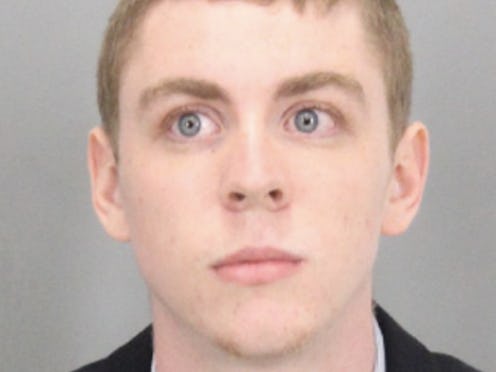
Brock Turner wants us to know he's sorry. Just a few days after the former Stanford student was convicted of three counts of sexual assault and sentenced to six months in county jail, The Guardian published an excerpt from Turner's statement to judge Aaron Persky in which he says he "would give anything to change what happened that night." In fact, even thinking about what happened on Jan. 17, 2015, when Turner was caught sexually assaulting an unconscious woman, "debilitates" him. "I can never forgive myself for imposing trauma and pain on [redacted]," he writes.
What it is exactly that Turner is sorry for, however, remains unclear. Not once in his excerpted statement does Turner even mention the words "sexual assault" — he refers to the crime he was convicted of and sentenced for as being, among other things, "my actions," "my poor judgement," and quite simply, "this event." He understands that what he did, however you want to describe it, caused "emotional and physical stress" on another person. He understands that, no, his life will never be the same, and while he wishes he "had the ability to go back in time" to change things, he understands that it's not possible. What Turner doesn't seem to understand is who or what is exactly to blame for what happened. And while Turner's statement certainly comes off as apologetic, there is one thing he seems to wish more than anything — that we would all just leave him alone. If there is a single excerpt from Turner's statement that sums up everything that is wrong with the blame-shifting that is rampant in the way we discuss sexual assault, it's this one:
At this point in my life, I never want to have a drop of alcohol again. I never want to attend a social gathering that involves alcohol or any situation where people make decisions based on the substances they have consumed. I never want to experience being in a position where it will have a negative impact on my life or someone else’s ever again. I’ve lost two jobs solely based on the reporting of my case. I wish I never was good at swimming or had the opportunity to attend Stanford, so maybe the newspapers wouldn’t want to write stories about me.
That's right. If Turner had never stepped foot in a pool, or gone to a top-tier university away from home where, as he puts it, the "influence that peer pressure and the attitude of having to fit in" can make a person do something they might later regret, maybe — just maybe — he wouldn't be in this position. Maybe the media wouldn't be lacerating his image from every direction. Maybe he never would have to wake up every morning "having dreamt of these horrific events," as he writes in his statement.
Maybe, had he not been surrounded by peer pressure or booze, he wouldn't have ever encountered the young woman at a party — the same young woman who would later recall what happened to her in chilling and heartbreaking detail in a letter she read out loud to Turner in court, and later allowed BuzzFeed to publish.
Except there is no maybe. Turner sexually assaulted a woman while she was unconscious. He took away her right to consent. The pointing of fingers in Turner's statement and his inability to directly shoulder any responsibility for his crime only seems to emphasize exactly what is wrong with the way our culture treats rape and assault. By focusing on the circumstances surrounding the crime, rather than the act of assault itself, we are telling survivors that what happened to them doesn't matter so much as how it happened. We are telling them that assault can be justified, that it can be someone's fault other than their attacker's. We're telling them that their stories aren't the only ones that matter.
In his statement, Turner says, "I want to let young people [k]now, as I did not, that things can go from fun to ruined in just one night." But that's not the discussion we should be having. The fact is, there is absolutely no excuse for assault. If Turner truly does want to lead by example as he says in his statement, then he needs to take full blame for his actions — and we as a culture need to shut down any discourse that might suggest, even for a second, him doing otherwise.
Image: Courtesy of the Santa Clara Sheriff's Office